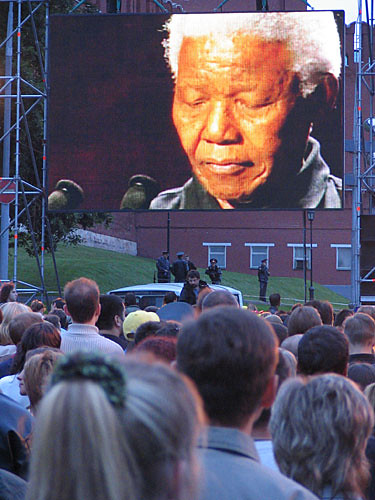The problem with trying to save Africans from starving...
A friend mentioned to me that the problem with African poverty is greater today than it was after Live Aid. He mentioned how ships carrying wheat were blocked from entering some African harbour and were re-directed to Russia, as a Russian ship with guns were allowed to dock. Our wheat traded for guns for the bloodthirsty warlords!!!

This article sums up exactly my feelings about aid to Africa. Don't get me wrong, the awareness of the issue is a good thing and is a starting point. But, many of us will just assume that our efforts to relieve billions of dollars in debt will really help the needy people, while not thinking about how we are still proping up these warlords who use starvation as a means of controling populations!!
Read on: http://jam.canoe.ca/Music/2005/06/28/1108477-sun.html
Toronto Sun Editorial
Let's put aside our natural skepticism about pop stars who lecture us on global politics and look at whether the goals behind Saturday's Live 8 concerts make sense.
Unlike 20 years ago, when Bob Geldof organized the first "Live Aid" concerts to raise funds for famine relief in Africa, Live 8 has a far more ambitious goal.

It's to mobilize public opinion in the eight wealthiest nations on earth (the so-called "G-8") in order to pressure their leaders to make aid to Africa a global priority for the next decade.
Last week, Geldof said Prime Minister Paul Martin should commit Canada to donating 0.7% of its Gross Domestic Product to foreign aid by 2015, or not bother showing up at next week's meeting of G-8 leaders in Scotland. Geldof's delusions of grandeur aside, does it make any practical sense to do that?
For Canada, this would mean hiking our foreign aid budget to $15 billion annually by 2015, compared to $3 billion today.
The added cost to taxpayers could be up to $41 billion over 10 years, equivalent to the amount of new money Martin has pledged to improve our health care during the same period.
Are Canadians ready to spend as much money trying to lift Africa and other parts of the world out of poverty as they are on improving their own health care system?
We think the answer is no, and that a more realistic figure needs to be found. But whatever amount of money Canada and the G-8 ultimately decide to commit to foreign aid, and specifically to Africa, the even bigger issue is how to distribute it.
Given the economic, political and social chaos across much of Africa today, simply promising more money is naive. Much of it will not end up helping Africa's poor, but rather propping up tyrants. That's what happened 20 years ago when money raised and donated by Live Aid didn't always reach Africa's starving poor. Instead, it was diverted into the pockets of bloody dictators like Mengistu Haile Mariam of Ethiopia.
This is why critics of these so-called "relief" concerts argue that pop stars simply don't know what they're talking about, and would be better advised to "shut up and sing".
This is not to suggest that Live 8 is not well-intentioned, nor that its organizers do not make a valid point about the West's exploitation of Africa, the major reason, along with internal corruption, that the continent is an economic basket case.
The problem with Live 8 is that it ignores the key issue, which is how economic assistance to Africa can be most effective.
Past experience has shown that simply raising money for distribution inside corrupt regimes won't work, and indeed can make a bad situation worse. Nor is trusting the United Nations to do it a viable option, as recent experience with the disastrous Oil for Food program in Iraq has shown.
To have aid to Africa do any good, the G-8 leaders will not only have to commit more money, but create an entirely new system for distributing it, perhaps similar to the Marshall Plan used to rebuild Europe after World War II. Anything less will simply mean pouring more money down a bottomless pit.












<< Home